| Listing 1 - 10 of 22 | << page >> |
Sort by
|
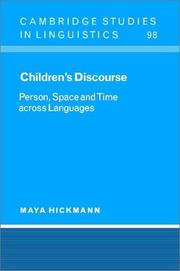
ISBN: 0521584418 0521065100 1107127386 0511178093 0511039840 0511148615 0511325916 0511486782 1280418761 0511054106 9780511486784 9780511039843 9780521584418 9780511054105 9781280418761 Year: 2003 Publisher: Cambridge Cambridge University Press
Abstract | Keywords | Export | Availability | Bookmark
 Loading...
Loading...Choose an application
- Reference Manager
- EndNote
- RefWorks (Direct export to RefWorks)
This comparative study explores two central questions in the study of first language acquisition: What is the relative impact of structural and functional determinants? What is universal versus language-specific during development? Maya Hickmann addresses these questions in three domains of child language: reference to entities, the representation of space, and uses of temporal-aspectual markings. She provides a thorough review of different theoretical approaches to language acquisition and a wide range of developmental research, as well as examining all three domains in English, French, German and Chinese narratives. Hickmann's findings concern the rhythm of acquisition, the interplay among different factors (syntactic, semantic, pragmatic) determining children's uses, and universal versus variable aspects of acquisition. Her conclusions stress the importance of relating sentence and discourse determinants of acquisition in a crosslinguistic perspective. Children's Discourse will be welcomed by those working in psychology and language-related disciplines interested in first language acquisition.
Discourse analysis, Narrative. --- Language acquisition. --- Space and time in language. --- Pedagogiek en onderwijskunde --- fundamentele pedagogiek. --- Psycholinguistics --- Comparative linguistics --- Discourse analysis, Narrative --- Language acquisition --- Space and time in language --- Language and languages --- Acquisition of language --- Developmental linguistics --- Developmental psycholinguistics --- Language development in children --- Psycholinguistics, Developmental --- Interpersonal communication in children --- Narrative discourse analysis --- Narration (Rhetoric) --- Acquisition --- Arts and Humanities --- Language & Linguistics
Book
ISBN: 9789027253149 9789027287564 9027287562 1282976931 9781282976931 9027253145 9786612976933 6612976934 Year: 2010 Volume: 52 Publisher: Amsterdam: Benjamins,
Abstract | Keywords | Export | Availability | Bookmark
 Loading...
Loading...Choose an application
- Reference Manager
- EndNote
- RefWorks (Direct export to RefWorks)
How and why do all children learn language? Why do some have difficulties while others are early language learners? What are the consequences of early bilingualism? Is it possible to reach native-like competence in a foreign language? Although we still cannot fully answer these questions, research during the last two decades has begun to solve some pieces of the puzzle. This book proposes an interdisciplinary collection of writings from some of the best specialists across several fields in cognitive science, offering a wide sample of recent advances in the study of first language acquisition, bilingualism, second language acquisition, and disorders of oral language. It is addressed to all researchers and students interested in language acquisition, as well as to teachers, clinicians and parents, who will find therein many new findings and varied methodological approaches, as well as challenging questions that are still debated and in need of further research.
Psycholinguistics --- Language acquisition --- Language and languages --- Study and teaching --- Foreign language study --- Language and education --- Language schools --- Acquisition of language --- Developmental linguistics --- Developmental psycholinguistics --- Language development in children --- Psycholinguistics, Developmental --- Interpersonal communication in children --- Acquisition --- Language acquisition. --- Study and teaching. --- Language and languages Study and teaching --- Language and languages - Study and teaching
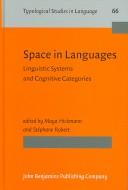
ISBN: 1282155857 9786612155857 9027293554 9789027293558 9789027229779 9027229775 9789027229786 9027229783 9781282155855 661215585X 9027229775 9027229783 Year: 2006 Volume: 66 Publisher: Amsterdam: Benjamins,
Abstract | Keywords | Export | Availability | Bookmark
 Loading...
Loading...Choose an application
- Reference Manager
- EndNote
- RefWorks (Direct export to RefWorks)
Space and time in language. --- Typology (Linguistics) --- Cognition. --- Psychology --- Grammar, Comparative and general --- Language and languages --- Linguistic typology --- Linguistics --- Linguistic universals --- Typology --- Classification --- Space and time in language --- Langage --- --Discours --- --Cognition --- Discours --- Cognition
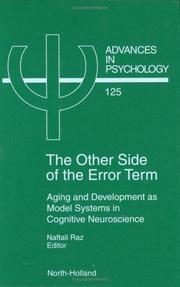
ISBN: 0123472253 9780123472250 Year: 1987 Publisher: Orlando (Fla.): Academic press,
Abstract | Keywords | Export | Availability | Bookmark
 Loading...
Loading...Choose an application
- Reference Manager
- EndNote
- RefWorks (Direct export to RefWorks)
Language. --- Thinking. --- Functionalism (Linguistics) --- Language acquisition --- Psycholinguistics --- Sociolinguistics --- Thought and thinking --- Mind --- Thinking --- Thoughts --- Educational psychology --- Philosophy --- Psychology --- Intellect --- Logic --- Perception --- Self --- Language and languages --- Language and society --- Society and language --- Sociology of language --- Language and culture --- Linguistics --- Sociology --- Integrational linguistics (Oxford school) --- Language, Psychology of --- Psychology of language --- Speech --- Acquisition of language --- Developmental linguistics --- Developmental psycholinguistics --- Language development in children --- Psycholinguistics, Developmental --- Interpersonal communication in children --- Functional analysis (Linguistics) --- Functional grammar --- Functional linguistics --- Functional-structural analysis (Linguistics) --- Grammar, Functional --- Grammatical functions --- Structural linguistics --- Critical Thinking --- Thinking Skills --- Thinking Skill --- Thinking, Critical --- Languages --- Social aspects --- Sociological aspects --- Psychological aspects --- Acquisition --- Language --- Thought --- Cognitive psychology --- Dialect --- Dialects
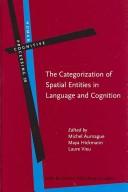
ISBN: 9789027223746 9027223742 Volume: 20 Publisher: Amsterdam: Benjamins,
Abstract | Keywords | Export | Availability | Bookmark
 Loading...
Loading...Choose an application
- Reference Manager
- EndNote
- RefWorks (Direct export to RefWorks)
Psycholinguistics --- Space and time in language --- Psycholinguistique --- --Categorization (Linguistics) --- Language acquisition --- Langage --- --Space and time in language. --- Psycholinguistics. --- Categorization (Linguistics) --- Language acquisition. --- Acquisition of language --- Developmental linguistics --- Developmental psycholinguistics --- Language and languages --- Language development in children --- Psycholinguistics, Developmental --- Interpersonal communication in children --- Classification (Linguistics) --- Linguistic analysis (Linguistics) --- Language, Psychology of --- Psychology of language --- Speech --- Linguistics --- Psychology --- Thought and thinking --- Acquisition --- Psychological aspects --- Space and time in language. --- Categorization (Linguistics). --- --Categorization (Linguistics).
Book
ISBN: 9782271066480 2271066484 2271091411 9782271091413 Year: 2009 Publisher: Paris CNRS
Abstract | Keywords | Export | Availability | Bookmark
 Loading...
Loading...Choose an application
- Reference Manager
- EndNote
- RefWorks (Direct export to RefWorks)
Comment et pourquoi les enfants apprennent-ils à parler? Pourquoi certains d'entre eux éprouvent-ils des difficultés pour y parvenir alors même que d'autres y réussissent précocément? Quelles conséquences peut avoir une situation de bilinguisme sur cet apprentissage? Peut-on acquérir une compétence native dans une nouvelle langue à l'âge adulte? Quelles sont les difficultés rencontrées plus spécifiquement à l'écrit? Les chercheurs ne sont pas encore en mesure de répondre de manière précise à toutes ces questions. Pourtant, les deux dernières décennies ont vu se préciser un grand nombre de réponses ou d'éléments de réponse. Cet ouvrage propose un large aperçu des avancées obtenues, à l'interface de plusieurs disciplines des sciences cognitives, concernant l'acquisition de la langue maternelle, le bilinguisme et l'acquisition des langues secondes, l'apprentissage de l'écrit et les troubles du langage, oral ou écrit. Cet ouvrage offre au lecteur un vaste panorama des recherches récentes et de leurs résultats, ainsi que des méthodes parfois extrêmement sophistiquées qui permettent de les obtenir. Il présente dans le même temps, les questions qui restent en suspens et que la décennie à venir aura à affronter. Il fournit aux enseignants, aux thérapeutes, aux parents et aux étudiants un ensemble de textes rédigés par quelques-uns des meilleurs spécialistes internationaux de l'acquisition du langage.
Language learning --- Bilingualism in children --- Language acquisition --- Second language acquisition --- Children --- Psycholinguistics --- Language acquisition. --- Langage --- Acquisition --- Interpersonal communication in children --- bilinguisme --- langues vivantes --- enfants

ISBN: 1282154796 9786612154799 9027292671 9789027292674 9789027223746 9027223742 9781282154797 6612154799 Year: 2007 Publisher: Amsterdam Philadelphia John Benjamins
Abstract | Keywords | Export | Availability | Bookmark
 Loading...
Loading...Choose an application
- Reference Manager
- EndNote
- RefWorks (Direct export to RefWorks)
This paper investigates certain puzzling predications about locations and physical objects. I argue first that locations and physical objects are distinct types of things. Locations and physical objects have different individuation conditions. So this should entail that nothing is both a location and a physical object. However, there are commonplace sentences in which terms seem to denote things that are both locations and physical objects. I provide a formal model for how to understand such sentences.
Space and time in language. --- Psycholinguistics. --- Categorization (Linguistics) --- Language acquisition. --- Language, Psychology of --- Language and languages --- Psychology of language --- Speech --- Linguistics --- Psychology --- Thought and thinking --- Classification (Linguistics) --- Linguistic analysis (Linguistics) --- Acquisition of language --- Developmental linguistics --- Developmental psycholinguistics --- Language development in children --- Psycholinguistics, Developmental --- Interpersonal communication in children --- Psycholinguistics --- Psychological aspects --- Acquisition --- Psycholinguistique --- Language acquisition --- Langage
Book
Year: 2018 Publisher: Amsterdam, [Netherlands] ; Philadelphia, [Pennsylvania] : John Benjamins Publishing Company,
Abstract | Keywords | Export | Availability | Bookmark
 Loading...
Loading...Choose an application
- Reference Manager
- EndNote
- RefWorks (Direct export to RefWorks)
Language acquisition. --- Language and languages --- Variation.
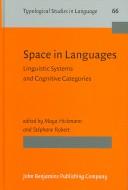
ISBN: 9027229783 9027229775 9786612155857 1282155857 9027293554 Year: 2006 Volume: 66
Abstract | Keywords | Export | Availability | Bookmark
 Loading...
Loading...Choose an application
- Reference Manager
- EndNote
- RefWorks (Direct export to RefWorks)
Space is presently the focus of much research and debate across disciplines, including linguistics, anthropology, psychology, and philosophy. One strong feature of this collection is to bring together theoretical and empirical contributions from these varied scientific traditions, with the collective aim of addressing fundamental questions at the forefront of the current literature: the nature of space in language, the linguistic relativity of space, the relation between spatial language and cognition. Linguistic analyses highlight the multidimensional and heterogeneous nature of space, while also showing the existence of a set of types, parameters, and principles organizing the considerable diversity of linguistic systems and accounting for mechanisms of diachronic change. Findings concerning spatial perception and cognition suggest the existence of two distinct systems governing linguistic and non-linguistic representations, that only partially overlap in some pathologies, but they also show the strong impact of language-specific factors on the course of language acquisition and cognitive development.
Psycholinguistics --- Grammar --- #KVHA:Taalkunde --- 801.56 --- 801.56 Syntaxis. Semantiek --- Syntaxis. Semantiek --- Cognition. --- Space and time in language. --- Typology (Linguistics). --- Cognitie --- Cognition --- Espace et temps dans la langue --- Espace et temps dans le langage --- Expression de l'espace et du temps (Linguistique) --- Langage -- Expression de l'espace et du temps --- Ruimte en tijd in de taal --- Space and time in language --- Temps et espace dans le langage --- Typologie (Linguistique) --- Typologie (Taalwetenschap) --- Typology (Linguistics) --- Grammar, Comparative and general --- Language and languages --- Linguistic typology --- Linguistics --- Linguistic universals --- Psychology --- Typology --- Classification
Book
ISBN: 1847696058 1280120894 9786613524751 184769604X 9781847696045 9781280120893 9781847696052 9781847696038 1847696031 Year: 2012 Publisher: Channel View Publications
Abstract | Keywords | Export | Availability | Bookmark
 Loading...
Loading...Choose an application
- Reference Manager
- EndNote
- RefWorks (Direct export to RefWorks)
This volume aims to provide a broad view of second language acquisition within a comparative perspective that addresses results concerning adult and child learners across a variety of source and target languages. It brings together contributions at the forefront of language acquisition research that consider a wide range of open questions: What are the precise mechanisms underlying acquisition? How can we characterize learners’ initial state and predict their degree of final achievement? What role do specific (typological) properties of source and target languages play? How does fossilization occur? How does the relative complexity of cognitive systems in adult and child learners affect acquisition? Does language learning influence cognitive organization? Can language learning shed light on our general understanding of human language and language processing?
Language acquisition. --- Acquisition of language --- Developmental linguistics --- Developmental psycholinguistics --- Language and languages --- Language development in children --- Psycholinguistics, Developmental --- Interpersonal communication in children --- Psycholinguistics --- Acquisition --- Perdue, Clive. --- Clive Perdue. --- Second Language Acquisition. --- attainment in language learning. --- cognition and language acquisition. --- fossilization . --- language processing. --- second language learning. --- successful language learning.
| Listing 1 - 10 of 22 | << page >> |
Sort by
|

 Search
Search Feedback
Feedback About UniCat
About UniCat  Help
Help News
News